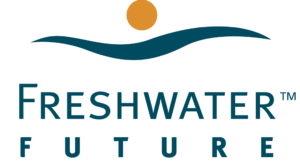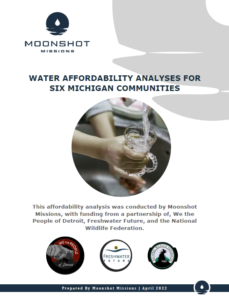DETROIT, Mich. (November 30, 2022) – Michigan has suffered from chronically high water rates for decades, forcing many families to live in unsafe conditions and putting elders and children at higher risk for health-related concerns. Water affordability programs are economically feasible in Michigan and can be applied to both rural and urban communities, finds a landmark new analysis by Moonshot Missions that was released today in partnership with We the People of Detroit, Freshwater Future, and the National Wildlife Federation. Moonshot Missions chose six communities, geographically distributed across the State, and found that, in all cases, a water affordability plan can be implemented to ensure affordable water rates for low-income households without adverse impact to utility revenues needed for service or the remainder of the customer base.
“Low-income affordability programs are needed to ensure universal access to drinking water and thereby protect the public health for all customers,” said Andy Kricun, report co-author and managing director at Moonshot Missions. “Our report not only shows that these programs are economically feasible but also identifies opportunities for these communities to increase their revenues by utilizing financial tools and cost reduction strategies that reduce overall revenue requirements.
“All Michiganders deserve clean, safe, and affordable water,” said Monica Lewis-Patrick, President & CEO of We the People of Detroit. “The COVID-19 pandemic highlighted water insecurity as a public health crisis. Yet many Michigan communities are facing impending water shutoffs or have already begun experiencing this inhumane practice in the aftermath of the pandemic. Just as our legislators took steps to protect our most vulnerable citizens by instating a moratorium on water shutoffs during the pandemic, it’s time to take a permanent stance against water insecurity and implement statewide legislation to that effect.”
The Water Affordability Analysis for Six Michigan Communities study proves the viability of a water affordability strategy that supports low-income residents and does not harm Michiganders who can afford their water or water utilities. The analysis focused on six communities across the state of Michigan: Grand Rapids, Flint, East Lansing, Benton Harbor, Houghton, and Ishpeming to show whether water affordability programs could reasonably be implemented across various incomes, locations, and populations. Currently, Michiganders pay more for water than they can afford, but the Moonshot report suggests that this does not have to be the case.
“Moonshot’s report found that regardless of household income or where a town is located, affordability programs can be implemented with little to no impact on water rates for everyone,” said Mike Shriberg, the National Wildlife Federation’s Great Lakes Regional Executive Director. “This extraordinary finding should guide Michigan’s water affordability policy and programs.”
“For years, residents and our community partners have spoken out about the need for affordable water. This important report shows that need can be met for all Michiganders,” said Jill Ryan, Executive Director of Freshwater Future.
The report recommends that communities evaluate affordability programs on a case-by-case basis, taking into consideration the financial means of the customers. It suggests that communities who are considering an affordability program should use tools such as those provided through Environment Finance Centers to test the effects of implementing an affordability program.
Download the report: 22-05-10 WPD Affordability Report_Final April 2022 (1)









